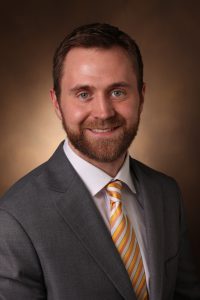Alumni Profile: John Erickson, M.D., Ph.D. (’15)
by Abin Abraham (M2)
 Dr. John Erickson, M.D., Ph.D.
Dr. John Erickson, M.D., Ph.D.
Resident Physician, PL-2
The Children’s Hospital of Philadelphia
Vanderbilt MSTP Graduate, 2015
I attended college at Case Western Reserve University, majored in Biology, and studied mechanisms of Plasmodium falciparum drug resistance in the laboratory of Peter Zimmerman. At Vanderbilt, under the mentorship of John V. Williams, I studied the cytotoxic T lymphocyte response to viral lower respiratory tract infections (e.g. bronchiolitis), in particular the cell surface receptors that modulate T cell functions. I found that Programmed Death-1 (PD-1) was highly expressed by virus-specific lung T cells during infection and functioned to decrease their cytokine production, ultimately leading to increased viral replication and disease burden. I am currently a pediatrics resident at the Children’s Hospital of Philadelphia. I am participating in the Accelerated Research Pathway leading to a fellowship in Neonatology. I hope to continue to study immune regulation during neonatal infections during fellowship.
How did you decide on a pediatric residency? How did your scientific and clinical interests influence your decision?
I reflected on my most memorable patients during medical school and I found that most of them were pediatric patients. I also tried to carefully gauge my own mood and happiness during each of my clinical rotations. It was also helpful for me to ask my wife for her opinion about which field she thought I liked the best. Sometimes we get weighed down by the day-to-day details of what we are doing and our friends and family can offer another vantage point. Clinically I was most interested in infectious diseases which tend to be more common in children, so I enjoyed seeing more of this. I also found the interaction with families to be satisfying, as much of what we do as pediatricians is to educate the family and provide reassurance.
What is the best part of pediatric residency? What is the most challenging aspect? What was the biggest surprise?
Best part: working/interacting with kids and the amazing co-residents who I learn from every day.
Most challenging aspect: managing family’s expectations, especially with critically ill children.
Biggest surprise: I came to CHOP planning on a career in infectious diseases but fell in love with the NICU!
What factors influenced your decision to pursue a residency at CHOP? What are some of the highlights of working at CHOP?
I was looking for a high volume program with exposure to every possible clinical disease entity with great resources to take care of any problem. I also was looking for a large program with lots of residents. CHOP is great place to work and extremely well respected in the community. There is exposure to the entire field of pediatrics. The patients tend to be sicker than most programs, which is great for someone interested in critical care. The attending physicians are also very interested in resident education. Finally, Philly is a very fun city with great food and a wide variety of things to do!
What advice would you have for trainees in the MSTP program interested in pursuing pediatrics and scientific research at the same time? What are some challenge you see facing current trainees?
Pediatric physician-scientists are in very high demand and I do not see that changing any time soon. I think that pediatrics is a great field for research as there is so much that is unknown and you can really make a huge impact with any kind of discovery. I think there remain challenges to becoming a successful researcher, but this is true for every field, not just pediatrics. I recommend being very proactive about this with selecting training programs that have a high motivation and a long track record for producing successful physician-scientists. I think it is helpful to reflect on the amazing privilege it is to do what we do. Science is fascinating for its own sake and for the ability to find answers to questions that have never been answered before. While this can be a long and difficult process, being a physician can provide immediate satisfaction by seeing patients improve and making a positive impact in their lives. Also, keep in mind that each patient we treat is in a way a small experiment, where we have a hypothesis about their disease process, gather data to support or refute that, and then determine if the treatment is indeed effective or not. For me, there is nothing else I would rather do.
In a scientific and clinical landscape that is constantly evolving, what advice do you have to make the most of our scientific and clinical training?
Never stop reading about new diseases you encounter in your clinical life. Never stop asking “why” until you are satisfied with the answers you get.
